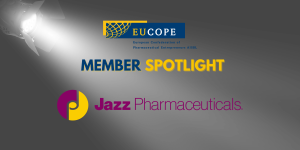Member Spotlight / News - May 4, 2022
EUCOPE Member Spotlight: Q&A with Jazz Pharmaceuticals
Every month, EUCOPE spotlights a member company and the great work they’re doing to advance the life sciences industry and drive innovation to serve patients better. In April, we spoke with Chris Tovey, Executive Vice President and Chief Operating Officer and Managing Director, Europe & International, Jazz Pharmaceuticals.
Chris was appointed to his current role in May 2021 following the acquisition of GW Pharmaceuticals, where he served as executive vice president and chief operating officer since joining GW in 2012. He brings over 30 years of commercial leadership and operations experience in the pharmaceutical industry to his role, where he oversees all Jazz commercial activities outside of North America, as well as global manufacturing and supply chain, and information technology and security.
Tell us about your organisation and its mission and how you drive innovation internally?
Jazz’s purpose is to innovate to transform the lives of patients and their families. This starts with identifying unmet needs across our therapeutic areas of focus—neuroscience and oncology—and taking the best discovery and development approach to solutions, whether that leverages our proprietary, industry-defining research platforms or our collaborations with leading investigators and bioscience companies, to deliver promising, novel therapies and potentially life-changing medicines for patients worldwide.
For many people, innovation in the industry is synonymous with new drug discovery and approval, and we are committed to innovation, leveraging both our market-defining cannabinoid science capabilities acquired through GW Pharmaceuticals and other proprietary platforms. And as part of our commitment to patients with unmet needs, we continually work to expand the science behind our therapies, acquire new medicines, and partner with researchers, academia and other industry leaders to advance molecules with great potential to create new or better standards of care.
However, we think about innovation beyond just traditional product R&D, looking at areas which have not always received the same level of industry focus, such as patient experience. As a recent example of this, we announced a new collaboration with Stand Up To Cancer® to accelerate cancer research in areas of significant need and discover how we can improve access to cancer therapies for people from underserved communities. This is the type of multisectoral partnership that helps to bridge the gaps that can sometimes occur between academics and companies when conducting clinical translational research, hopefully enabling us to address some of the largest hurdles in healthcare.
Finally, every innovation strategy needs highly skilled and motivated people to implement it. Jazz was founded on – and continues to foster – a culture at all levels of collaboration, innovation and inclusion that values integrity, passion and the pursuit of excellence that is grounded in a deep commitment to patients. In fact, innovation is one of our core values at Jazz and employee commitment to those values is part of what makes Jazz such a great place to work.
How do your organisation’s activities help patients now and into the future?
When talking about innovation just now, I mentioned the need to look at areas such as patient experience, as well as drug discovery. I think this reflects the importance we attach, as so many in our industry do, to seeking out additional ways to improve outcomes for people living with rare or difficult-to-treat diseases.
We believe all people, particularly those who live with complex conditions, deserve new and better therapeutic options. As we speak, our research and development teams are using their expertise to lead clinical programmes across epilepsy, essential tremor, multiple sclerosis (MS), post-traumatic stress disorder (PTSD), psychiatry and neurodegenerative diseases, as well as blood and solid tumour cancers.
Patient experience is therefore immensely important, and we are committed to exploring ways to deliver new value and better solutions at every touchpoint we can in the patient journey. These encompass areas of interest to everyone in our industry, such as ensuring the diversity of patients enrolled in clinical trials and the inclusion of patients and their views in R&D programmes. All this begins with listening to patients and the people who care for them, as well as physicians and advocacy groups, to find new opportunities to make a positive difference.
For example, Jazz Spain recently launched Leukemia-lma.org – a website developed in association with AEAL (Spanish Association of People Affected by Lymphoma, Myeloma and Leukaemia), whose purpose is to provide information and educational resources to people who have recently been diagnosed with acute myeloid leukaemia (AML) and their relatives. We know that a cancer diagnosis can lead to many questions about the disease, its treatment and its impact on the family. But often, people diagnosed with AML have additional questions about the cause of their illness – and their specific disease pathology – and it’s these questions that Leukemia-lma.org hopes to answer.
Another, less obvious but nonetheless important, way of supporting patients is through appropriate investment to stimulate the innovation that enables industry to bring more medicines to patients. Over the past two decades, GW made significant investments in its main manufacturing site in the UK, building major in-house processing and manufacturing expertise. We’ve now announced a further $100 million (£75m) strategic investment in a new state-of-the-art facility there – which underlines Jazz’s continued commitment to patients: this new facility will help us bring potentially life-changing medicines to more patients worldwide who desperately need them. The facility, which is expected to open in 2024, will not only significantly increase our ability to support the growing demand for our medicines, but help us maintain our position as a world leader in cannabinoid science.
What do you see as the biggest challenge facing the life sciences industry today?
I don’t feel that we are facing a single massive challenge. Instead, we face multiple, intricately connected but individual challenges in bringing innovative new medicines to the patients that need them.
We’re now living and operating in a post COVID world where our industry has received a welcome reputational boost from the success of vaccine development programmes. With that comes greater societal input, scrutiny and expectation, so one of the challenges I think about is how to continue innovating on behalf of patients and their families while listening, learning, and evolving our business model in this fast-changing environment.
For example, Environmental, Social, Governance (ESG) is fundamental to our strategy, purpose and culture. We have created an ESG strategy and social impact initiatives, with ultimate oversight maintained by our Board of Directors. We are also guided by our stakeholders and third-party frameworks including the Sustainability Accounting Standards Board (SASB) Biotechnology & Pharmaceuticals standard, which affirms our commitments to the safety of clinical trial participants, access to medicines, drug safety and other priorities important to our stakeholders.
I’ve already mentioned our site investment in the UK and our new facility has been designed with careful consideration of the environment, which will continue through its build phase and use. As an example, the use of single-use plastics will be minimised and more than 1,100 solar panels will be installed to provide a portion of the building’s energy usage.
Another challenge I see, which is also an opportunity for our industry, is the creation of a working culture that meets both the expectations of society as a whole and of our future workforce. We must ensure that a new, diverse and talented workforce choose to make their careers in the pharma industry and attract and retain the brightest and the best. People with the skills and experience we need are a precious and valued commodity and are increasingly choosing to work for companies that make a positive societal impact. They are also looking for a flexible and positive location-based working model that provides them with options, and which will actually likely enhance their productivity. Jazz is committed to creating a company where the culture reflects three important goals – our purpose to serve patients, be a great place to work, and to live our core values of integrity, collaboration, passion, innovation, and pursuit of excellence.
I have already referred to the importance of a motivated workforce to create an innovative culture, and a motivated workforce is created in large part through fair and equal treatment, where people are empowered to contribute and succeed. Among the initiatives we have created at Jazz are goals for our Diversity, Equity, Inclusion and Belonging (DEIB) practices, including targets to increase gender, racial and ethnic leadership diversity, and to achieve gender parity across all levels at Jazz by 2025. We’ve also established employee-led resource teams that aim to create an inclusive environment, foster innovation, support our corporate values, and improve the way we work together globally to better serve patients, employees, and the communities around us. They help connect our employees with similar visions and interests in an inclusive, welcoming, and collaborative setting and are governed by senior leader co-sponsors –with further support from Executive Leadership and co-led by committed employees passionate about these areas.
There is more that we all can and should do, but I am proud that we are stepping up to these challenges.
What are the major health policy issues and themes that you are most focused on in 2022?
This is an important year which holds much potential for industry from a health policy perspective across a wide range of areas. Firstly, we’re following with great interest the review of the EU general pharmaceutical legislation, particularly the more tangible proposals that may follow by the end of this year. Reforms focused on orphan and paediatric medicines – via the Orphan Medicinal Products (OMP) Regulation – have the potential to foster a cycle of biopharmaceutical innovation for the benefit of all patients.
We welcome the work EUCOPE has been doing to maximise the opportunity the OMP and wider reforms present. Most notably, we agree that in order to stimulate further investment and innovation, existing incentives should be retained and expanded – particularly the package of incentives currently afforded to ultra-rare conditions and where serious unmet need exists.
Jazz would also welcome the introduction of more regulatory flexibilities – basket studies, conditional marketing authorisations (MAs), and other forms of robust evidence generation and enhanced patient/caregiver involvement in drug development and value assessment. In common with all stakeholders in the Orphan/Rare disease ecosystem, we hope that any changes to the EU framework will be flexible enough not just to accommodate the current science but also be future proofed to adapt accordingly, such as adaptability to accommodate new biomarkers. Harmonisation across Europe and globally of clinical trials requirements would also help to reduce legal, financial, and operational barriers.
We are excited about the Rare 2030 foresight study and the commitment shown by the French Presidency as well as the Commission’s call for stronger European Union cooperation around rare diseases. We also welcome the launch of the European Joint Programme on Rare Diseases which showcases strong promise and look forward to the forthcoming Council conclusions in June, as well as to continued commitment to encouraging medicine development in the rare disease space by the upcoming Czech and Swedish presidencies.
We welcome Europe’s Beating Cancer Plan and see Europe as having a real opportunity to provide leadership in developing a policy framework that will drive early diagnosis, detection and treatment of cancer.
Within the cannabinoid space, to unlock the potential of this exciting new class of medicines and best serve patients, we believe it is crucial for companies to be encouraged and incentivised to invest in comprehensive drug development programmes and pursue regulatory approvals. We believe strongly that cannabis-based products should not be treated as an exception to the ‘gold standard’ system the European Medicines Agency (EMA) has developed. We are already seeing a gradual erosion of the application of this gold standard to cannabis-based products in many European member states. In our minds, this sets a worrying precedent for patient safety and wellbeing and has the potential to disincentivise future investment.
As a company with a large manufacturing footprint in the UK, alongside significant facilities in Italy and Ireland, we watch with great interest the impact of Brexit on supply chains and will continue to advocate for the greatest level of openness and harmonisation between the UK and EU, including mutual recognition of good manufacturing practice as foreseen in the EU-UK Trade and Cooperation Agreement.
Finally, we must all capitalise on the lessons from the COVID-19 pandemic and the Pharmaceutical Industry’s constructive response. We hope that efficient use of existing obligations will take precedence over additional requirements, and that alignment of national variations will improve efficiency and certainty. We all need to remain mindful of the considerable strain that the pandemic has placed on healthcare systems – with many struggling financially, alongside challenges in addressing long waiting lists, which have left many patients without timely (and often life-saving) treatment options.
What attracted you to join EUCOPE and how can we help you achieve your business goals?
We originally joined EUCOPE in 2018 because we wanted to work alongside other similarly sized companies whose experiences of pharmaceutical industry life matched our own, and within an organisation specifically geared up to represent our collective interests and perspectives. We felt that our voice and opinions would be clearly heard in EUCOPE and that we’d be able to be active participants amongst peer companies. Small, innovative companies are often fiercely independent, so we value the fact that EUCOPE is able to successfully harness and focus our collective energies to address key and complex challenges.
When Jazz joined in 2018, we lacked the resource to engage independently in Brussels, so through our membership of EUCOPE, we’ve been able to far more effectively understand, follow and contribute to areas important to our patients, our business and our industry sector. And while we’ve grown extensively in recent years, increasing our in-house capabilities, EUCOPE continues to provide information and opportunity to effectively engage at multiple levels in Brussels, including areas of wider policy with significant implications for patients and industry alike.
For more information about EUCOPE membership
Learn about our Benefits of Membership, or schedule an introductory call with our Business Development Manager Dante Di Iulio diiulio@eucope.org.


